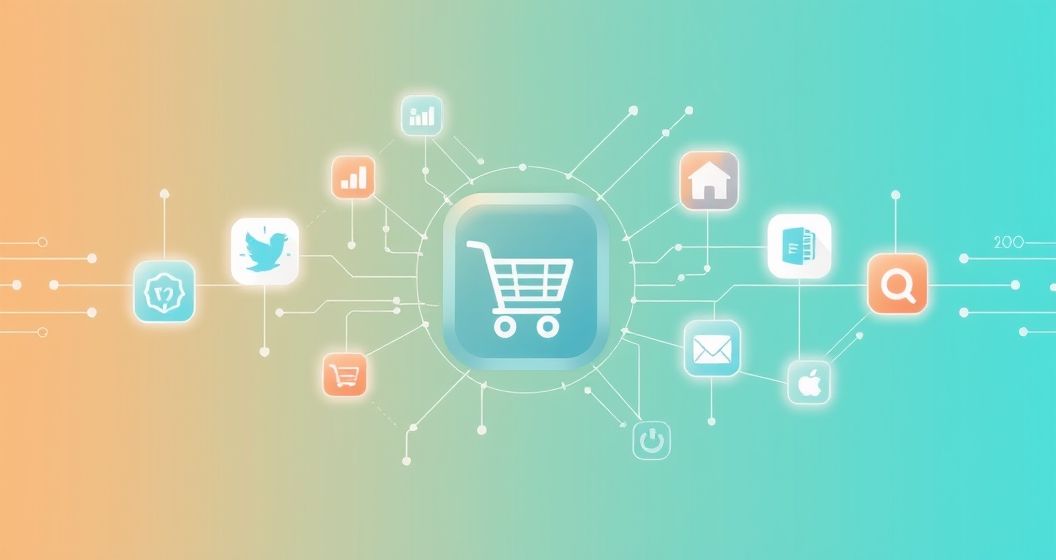In the dynamic world of online retail, effectively managing an Etsy shop requires more than just creating unique products. Modern sellers increasingly leverage Etsy integrations to streamline operations, enhance customer experiences, and scale their businesses. These powerful tools connect your Etsy store with various external applications, automating tasks and providing valuable insights. Understanding how to utilize these integrations is crucial for any seller aiming to optimize efficiency and achieve sustained growth in the competitive e-commerce landscape.
Understanding Etsy Integrations for Enhanced Selling
Etsy integrations refer to the process of linking your Etsy store with third-party software or platforms. These connections facilitate the seamless flow of data and automation of tasks across different aspects of your online business. Instead of manually transferring information between systems, integrations allow various tools—from shipping software to accounting programs—to communicate directly with your Etsy shop. This interconnectivity is fundamental for modern e-commerce operations, helping sellers manage their entire business ecosystem more cohesively.
Transformative Benefits of Integrating Your Etsy Shop Operations
Implementing strategic Etsy integrations offers numerous advantages that can significantly impact a seller’s operational efficiency and overall business performance. By automating routine processes, sellers can reclaim valuable time previously spent on repetitive administrative tasks. This shift allows for greater focus on product development, marketing initiatives, and customer engagement, which are critical drivers of growth. Ultimately, these integrations empower sellers to manage their operations with greater precision and less manual effort.
Increased Efficiency and Time Savings
One of the primary benefits of Etsy integrations is the substantial increase in operational efficiency. Automating tasks such as order processing, inventory updates, and shipping label generation dramatically reduces the time required for daily management. This automation minimizes human error, ensuring accuracy across all transactions. Sellers can process more orders in less time, freeing up resources to concentrate on creative pursuits and strategic business development, rather than getting bogged down by administrative burdens.
Data-Driven Insights and Informed Decision Making
Etsy integrations often provide sellers with a unified view of their business data. By consolidating information from sales, inventory, and customer interactions, these tools offer comprehensive analytics and reporting capabilities. Access to such detailed insights enables sellers to make more informed decisions regarding product strategy, pricing adjustments, and marketing campaigns. Understanding customer behavior and sales trends through integrated data empowers business owners to proactively adapt their approach and optimize for greater success.
Expanded Reach and Multichannel Selling Capabilities
For sellers looking to grow beyond Etsy, integrations facilitate multichannel selling by synchronizing product listings and inventory across various platforms. This capability ensures consistent product availability and pricing, preventing overselling or stock discrepancies. Expanding sales channels through robust integrations allows businesses to reach a broader audience, diversify their revenue streams, and reduce reliance on a single marketplace. It’s a strategic move for long-term business resilience and market penetration.
Essential Categories of Etsy Integration Solutions
Inventory and Order Management Systems
Inventory and order management systems are crucial Etsy integrations for maintaining accurate stock levels and processing customer orders efficiently. These tools automatically update inventory counts across all selling channels as items are sold, preventing overselling and potential customer dissatisfaction. They provide a centralized dashboard for tracking stock, managing returns, and monitoring order statuses, offering a comprehensive overview of your product flow.
Beyond simple tracking, these integrations streamline the entire order fulfillment workflow. They can automate the transfer of order details to shipping providers, generate picking lists for efficient packing, and update customers with status changes. By consolidating these functions, sellers gain greater control over their product lifecycle, from initial listing to final delivery, ensuring smooth and professional operations.
Shipping and Label Generation Tools
Shipping integrations simplify one of the most time-consuming aspects of e-commerce for Etsy sellers. These platforms connect directly with your Etsy shop to import order details, allowing for automated label creation with pre-filled customer information. Many solutions also offer rate comparison features, helping sellers identify the most cost-effective and reliable shipping options for each order, optimizing shipping expenses.
Furthermore, these tools often include features like automated tracking number uploads to Etsy and direct customer notifications, enhancing the post-purchase experience. This level of automation reduces manual data entry, minimizes errors, and ensures that customers receive timely updates on their shipments. Efficient shipping contributes significantly to customer satisfaction and repeat business.
Accounting and Financial Management Software
Integrating accounting software with your Etsy shop provides a clear and accurate picture of your financial health. These integrations automatically sync sales data, expenses, and transaction fees, eliminating the need for manual data entry into spreadsheets. This automation saves considerable time and significantly reduces the potential for costly errors in financial records.
Such tools are invaluable for simplifying tax preparation and financial reporting. They categorize income and expenses, generate profit and loss statements, and help track deductible business costs. Access to real-time financial data enables sellers to monitor their profitability, make informed budget decisions, and ensure compliance with financial regulations, fostering long-term stability.
Print-on-Demand (POD) and Dropshipping Platforms
For Etsy sellers looking to expand their product offerings without the burden of inventory management, print-on-demand (POD) and dropshipping integrations are transformative. These platforms allow sellers to offer a wide range of customized products, from apparel to home goods, with no upfront investment in stock. When an order is placed on Etsy, the integration automatically forwards it to the POD or dropshipping supplier for production and direct shipment to the customer.
This operational model minimizes risk and capital outlay, enabling sellers to experiment with new designs and product lines easily. The integration handles the crucial aspects of order routing, manufacturing, and fulfillment, allowing the Etsy seller to focus on design, marketing, and customer service. It opens up opportunities for greater product diversity and business scalability.
Marketing and Customer Relationship Management (CRM) Solutions
Marketing and CRM integrations are pivotal for building strong customer relationships and driving repeat sales on Etsy. These tools help sellers manage customer data, track purchase history, and segment their audience for targeted marketing efforts. They allow for personalized communication, such as automated thank-you emails or follow-ups, enhancing the overall customer experience.
Additionally, these integrations can automate various marketing activities, including email campaigns, social media scheduling, and promotional outreach. By centralizing customer information and automating communications, sellers can cultivate loyalty, encourage reviews, and effectively promote new products or special offers. This proactive approach to customer engagement is vital for sustained business growth.
Strategic Considerations for Choosing Etsy Integrations
Selecting the right Etsy integrations requires careful consideration of your specific business needs and long-term objectives. It is essential to assess which areas of your operation would benefit most from automation and enhanced data management. Prioritize integrations that address your most pressing pain points, whether it’s inventory control, shipping efficiency, or financial tracking, to ensure the greatest impact on your business.
When evaluating potential solutions, consider factors such as compatibility with your existing systems, ease of use, and the level of customer support provided. Evaluate the pricing structures and ensure they align with your budget and offer a clear return on investment. Scalability is also crucial; choose tools that can grow with your business as your Etsy shop expands and its operational demands evolve.
Implementing and Optimizing Your Etsy Integration Strategy
A successful Etsy integration strategy involves more than just selecting the right tools; it also requires thoughtful implementation and continuous optimization. Begin by thoroughly researching each integration’s features and ensuring they align with your operational requirements. During setup, follow detailed guides and leverage available support resources to configure the connection correctly and prevent potential issues.
Once implemented, regularly monitor the performance of your integrations to ensure they are functioning as expected and delivering the desired efficiencies. Collect feedback on their impact on your workflow and customer experience. Periodically review your integration stack to ensure it remains aligned with your evolving business goals, making adjustments or exploring new tools as needed to maintain peak operational performance.
Maximizing Etsy Potential Through Strategic Integrations
Etsy integrations are not merely add-ons but essential components of a robust and efficient online business strategy. By thoughtfully integrating various tools, sellers can automate repetitive tasks, gain deeper insights into their operations, and significantly enhance the customer experience. This strategic approach to business management allows Etsy shop owners to focus more on their craft and less on administrative burdens, paving the way for sustainable growth and long-term success in the competitive e-commerce landscape. Embracing these powerful connections is a definitive step towards unlocking your Etsy shop’s full potential.






